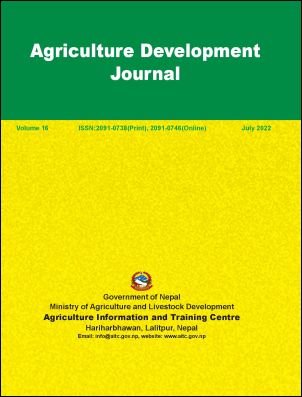Factors Affecting Adoption of Home Garden Farming among Disadvantaged Group (DAG) of Jhapa District
DOI:
https://doi.org/10.3126/adj.v16i1.51664Keywords:
Factors, Income, Home garden, Problems, SustainableAbstract
Home garden provides fruits and vegetables to the household with direct access to important nutrients that may not be readily available or within their economic reach. Therefore, home gardening would be a good means to improve household food security. The study was conducted in the Dharampur, Dangibari and Dhaijan area of Jhapa to assess the factors affecting adoption of home garden farming among disadvantaged group of people. Altogether 120 respondents (40 respondents from each places mentioned above) were randomly chosen for study. The study showed that the home garden contribution on annual household income was 19.23% and livestock component was identified as most profitable component as it contributes 50.92% of home garden incomes followed by vegetable component (25.02%). It was found that the mean annual income from home garden was NRs 37697.24 in practitioner household and was significant (P=0.05). The study revealed that age of household head, years of schooling were negatively related to home garden adoption, whereas trainings, exposure, number of species were positively related to home gardens adoption. In regard to the problems related with production, respondents ranked unavailability of quality seedling or sapling (64.2%) as major problem followed by limited cultivable land (57.5%). Home garden was sustainable approach as it relies on low external input use system and better institutional linkage, socio economic empowerment of women and disadvantaged groups made it further sustainable. This necessitates diversifying home garden approach so as to cover social and economic dimension of household resources for sustainable development and to support in livelihood system.




